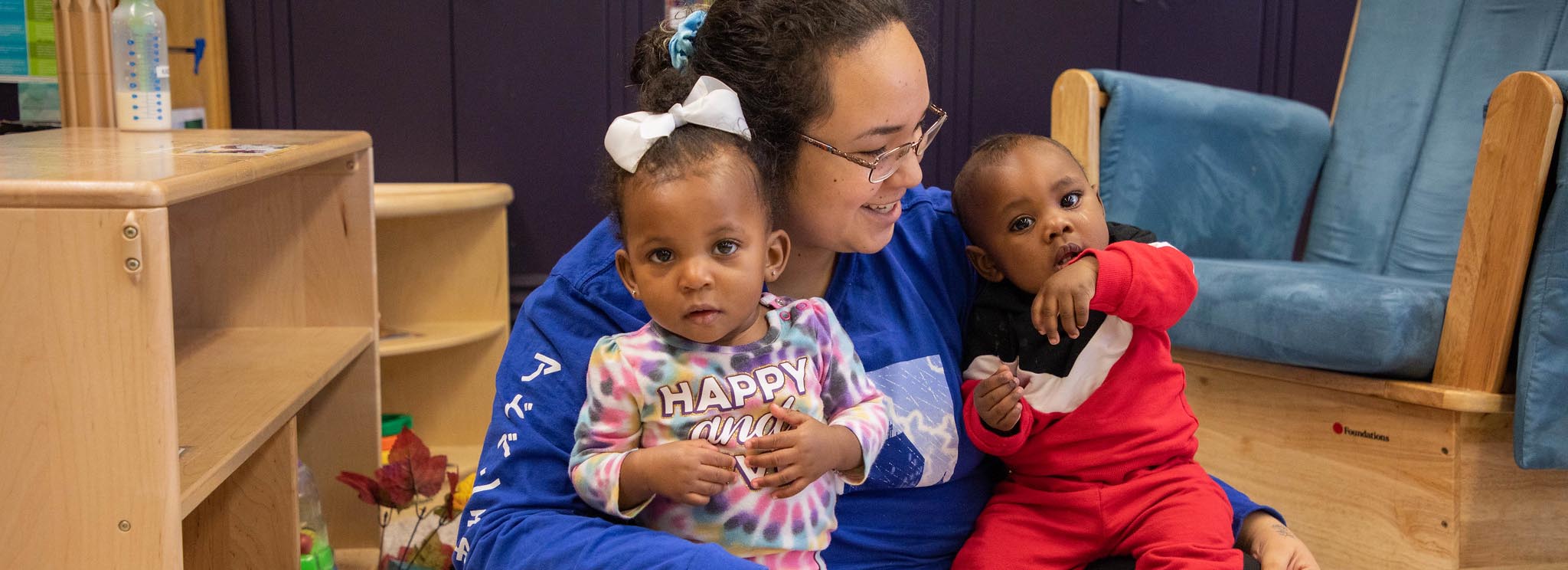Center for Early Head Start
Educational Services
Educating Young Children
Texas Tech University Center for Early Head Start believes that children reach their highest potential in an atmosphere of caring and respect that offers many opportunities to learn in ways that meet the needs of each child while respecting each family's culture, values, and identity.
Teachers design activities to meet the needs and interests of children using one-on-one, small group, and large group experiences, with an emphasis on the development of the whole child—physical, social, emotional, and cognitive. Learning through play by exploring the environment and through interacting with others are important pieces of each child's education. Children progress at their own pace as they are supported and encouraged by caring adults. Teachers emphasize the relationship between children and their family members, seeing the family as the child's most important first educator.
Curriculum
Each program option uses a research-based, successful approach to early education. These approaches encourage family involvement, active play-based learning, and individualization to meet the needs of every child.
The Home-Based program uses Partners for a Healthy Baby as the basis for developing plans for their work with each child and family.
The Center-Based program uses HighScope curriculum to develop daily lesson plans for each child.
School Readiness Goals
This program has also developed School Readiness Goals for children based on the Head Start Early Learning Outcomes Framework (2015). These goals are:
Social and Emotional
- Children will develop positive relationships with friends and familiar adults.
- Children will develop the ability to understand and manage their emotions.
Approaches to Learning
- Children will develop their natural curiosity and independence.
- Children will develop persistence and problem-solving.
Physical Health and Development
- Children will demonstrate control of their large and small muscles.
- Children will begin to express their needs and do simple personal care tasks.
Cognition and General Knowledge
- Children will gain new knowledge through daily routines and interaction with engaging materials and activities.
- Children will develop creativity and use their imagination in play.
Language and Literacy
- Children will use and understand spoken language.
- Children will interact with pictures, books, and writing materials.
- Children will develop listening skills and new vocabulary through interaction with rhymes, stories, and songs.
Assessment
As part of their enrollment in the Center for Early Head Start, children are provided with ongoing assessment of their developmental skills.
With family permission, teachers conduct developmental screenings on each child upon enrollment. These screenings look at each child's cognitive and physical development, social-emotional development, and hearing and vision skills. The results of this screening are shared with families and used as a baseline to begin planning appropriate experiences for that child.
Teachers then begin using the HighScope Child Observation Record - online COR Advantage to do ongoing assessments for each child. COR allows teachers to look at each child's individual progress in important developmental areas.
In addition, teachers and families work together to complete the Ages and Stages Questionnaire: Social-Emotional twice each year to assess children's behavioral development.
Assessment results are then used to determine both the interests and needs of individual children, look at developmental progress, and make improvements to both teaching practices and the classroom. Results are discussed with each family three times annually at a minimum, and families are encouraged to provide feedback and set educational goals for their child.
Community
Program staff understand that children and their families are part of the larger community in which they live. Staff use their knowledge of the community as a basis for planning additional learning experiences for each child.
In order to provide a variety of experiences, the program connects with resources such as local libraries, businesses, visual and dramatic artists, storytellers, and public service organizations (such as Fire and Police services). Families are also encouraged to share information about their cultural heritage with teachers and the classroom, in order to promote diversity and acceptance of all.
Center for Early Head Start
-
Address
3315 East Broadway, Lubbock, TX 79403 -
Phone
806.765.2737 -
Email
earlyheadstart@ttu.edu

